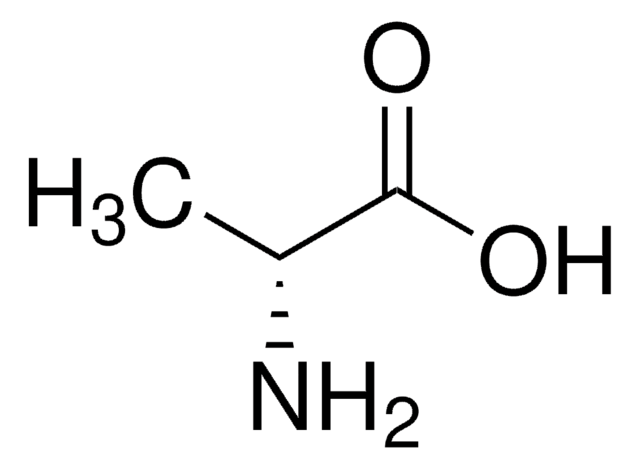A7469
L-Alanine
98.5-101.0%, suitable for cell culture, BioXtra, non-animal source
Synonym(s):
(S)-2-Aminopropionic acid, L-α-Aminopropionic acid
About This Item
Recommended Products
product name
L-Alanine, from non-animal source, meets EP, USP testing specifications, suitable for cell culture, 98.5-101.0%
biological source
non-animal source
Quality Level
Agency
meets EP testing specifications
meets USP testing specifications
product line
BioXtra
Assay
98.5-101.0%
form
powder
technique(s)
cell culture | mammalian: suitable
impurities
endotoxin, tested
color
white
solubility
H2O: 100 mg/mL
application(s)
peptide synthesis
pharmaceutical (small molecule)
SMILES string
C[C@H](N)C(O)=O
InChI
1S/C3H7NO2/c1-2(4)3(5)6/h2H,4H2,1H3,(H,5,6)/t2-/m0/s1
InChI key
QNAYBMKLOCPYGJ-REOHCLBHSA-N
Looking for similar products? Visit Product Comparison Guide
Application
Biochem/physiol Actions
Storage Class Code
11 - Combustible Solids
WGK
WGK 1
Flash Point(F)
Not applicable
Flash Point(C)
Not applicable
Personal Protective Equipment
Certificates of Analysis (COA)
Search for Certificates of Analysis (COA) by entering the products Lot/Batch Number. Lot and Batch Numbers can be found on a product’s label following the words ‘Lot’ or ‘Batch’.
Already Own This Product?
Find documentation for the products that you have recently purchased in the Document Library.
Customers Also Viewed
Muscle
Articles
This is an article about how proliferatively active cells require both a source of carbon and of nitrogen for the synthesis of macromolecules. Although a large proportion of tumor cells utilize aerobic glycolysis and shunt metabolites away from mitochondrial oxidative phosphorylation, many tumor cells exhibit increased mitochondrial activity.
Chromatograms
application for HPLCOur team of scientists has experience in all areas of research including Life Science, Material Science, Chemical Synthesis, Chromatography, Analytical and many others.
Contact Technical Service







